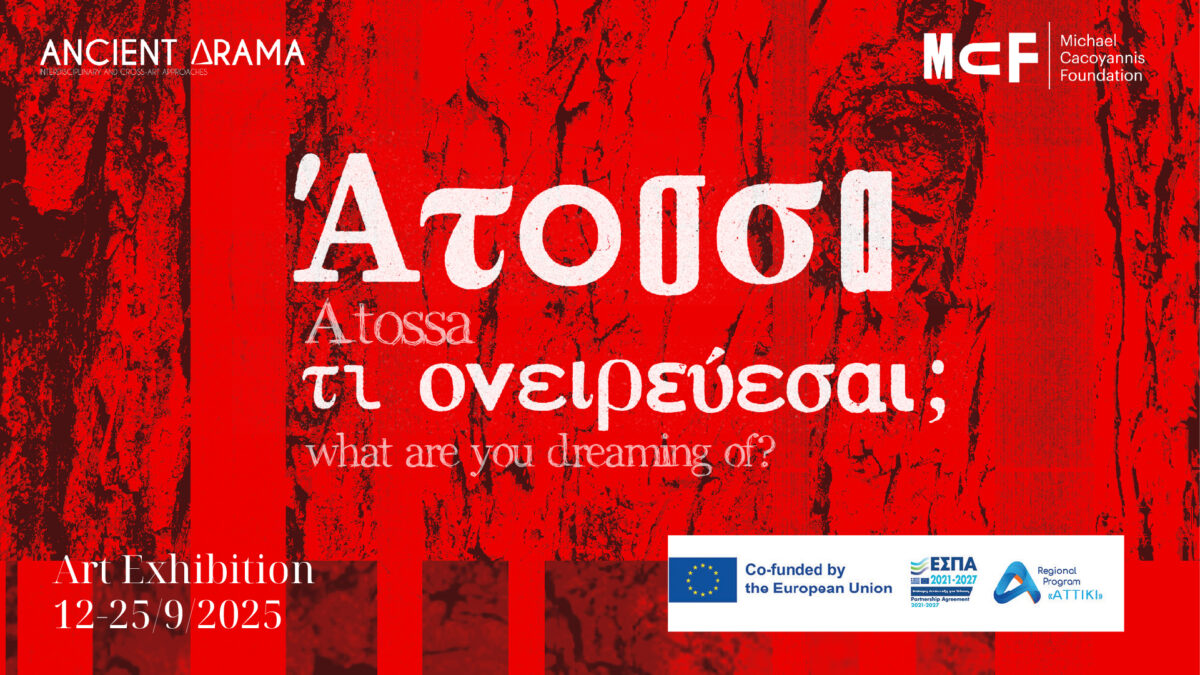
“Atossa, what are you dreaming of?”
Visual Arts Exhibition
Inspired by Aeschylus’ tragedy The Persians
At the Michael Cacoyannis Foundation
September 12–25 2025
Part of the program “Ancient Drama: Interdisciplinary and Cross Cultural Approaches”
Free Admission
Aeschylus’ anti-war tragedy The Persians, the oldest surviving theatrical work in the world, serves as the source of inspiration for the 28 visual artists participating in the group exhibition “Atossa, What are you dreaming of?”, hosted by the Michael Cacoyannis Foundation from September 12 to 25, 2025. The exhibition is part of the European program “Ancient Drama: Interdisciplinary and Cross Cultural Approaches.”
The tragedy explores universal themes regarding war: its devastating consequences for both winners and the defeated; human responsibility in reference to the community and nature; various aspects of loss and mourning; the arrogance and imbalance inherent in authoritarian and imperial power; and hubris as an inevitable outcome. The participating artists interpret these themes through the lens of today’s global crises, aligning their work with the thematic axis “Ancient Tragedy in the Age of the Anthropocene: Ancient Drama and Contemporary Global Tragedy.”
The exhibition opens on Friday, September 12, at 19:00 and will remain open daily from 18:00 to 22:00 until September 25, 2025.
Rena Avagianou, Katerina Aslanidou, Iakovos Vais, Chrιsa Valsamaki, Giannis Galaios, Elli Griva, Leonidas Giannakopoulos, Thalassini Douma, Markos Evlogimenos, Katerina Kalantzidou, Georgia Kalogeropoulou, Vasiliki Koskiniotou, Afroditi Krontiri, Matina Mavronikola, Dimitris Miliotis, Lamprini Boviatsou, Ismini Bonatsou, Kostas Daflos, Calli Doltcetti, Afroditi Papadouli, Marios Pelonis, Eleni Pechlivani, Angeliki Svoronou, Foivos Sofikitis, Photini Stephanidi, Martha Tsiara, Voula Ferentinou, Sofia Houliara.
The exhibition “Atossa, What are you dreaming about?” is presented as part of the program “Ancient Drama: Interdisciplinary and Cross Cultural Approaches,” organized by the Michael Cacoyannis Foundation in collaboration with the University of São Paulo, Brazil. It is curated by Calliope Liadi, artistic advisor of the program.
The program also features the theatrical performance Prometheus Cancelled by the Brazilian theater group Trupe Pé na Arte, along with a series of workshops, webinars, and an international forum—all aiming to draw connections between ancient tragedy and contemporary realities. Art historian Dr. Athina Exarchou writes in the exhibition catalogue:
“The main theme of the tragedy is Xerxes’ hubris, which leads to punishment—nemesis—and ultimately to the viewer’s emotional catharsis. In modern world, however, how often is the arrogance of power truly punished? And who bears the consequences of errors when some kind of backlash arises? It is ordinary people—mothers and children—who suffer the consequences of the ambitions of leaders and the greed of those who always want more. Nature, too, sooner or later strikes back, and the punishment seldom burdens the actual culprit but instead those who live in the zones of intervention.
This exhibition presents a range of visual works that critically engage with the questions raised by The Persians. Using diverse aesthetic media—painting, drawing, printmaking, sculpture, installations, photography, and video—the artists explore both the drama of Atossa as a central figure striving to interpret her visions and their fulfillment, and Xerxes’ hubris with the suffering it engenders. They bring these themes into the present, questioning: How does the average Western individual experience the struggle for survival amid wars of interest and under a voracious leadership? Are the ‘gods’ still the ones shaping our fate, or are there alternative routes to navigate beyond the traps of Western civilization?”
The program “Ancient Drama: Interdisciplinary and Cross Cultural Approaches” runs from September 17–21, 2025, as part of the initiative “Establishment and Promotion of International Institutions of Contemporary Culture in Attica.”
The initiative is co-funded by the European Union – European Regional Development Fund, through the Regional Program “Attica”, within the framework 2021–2027.


